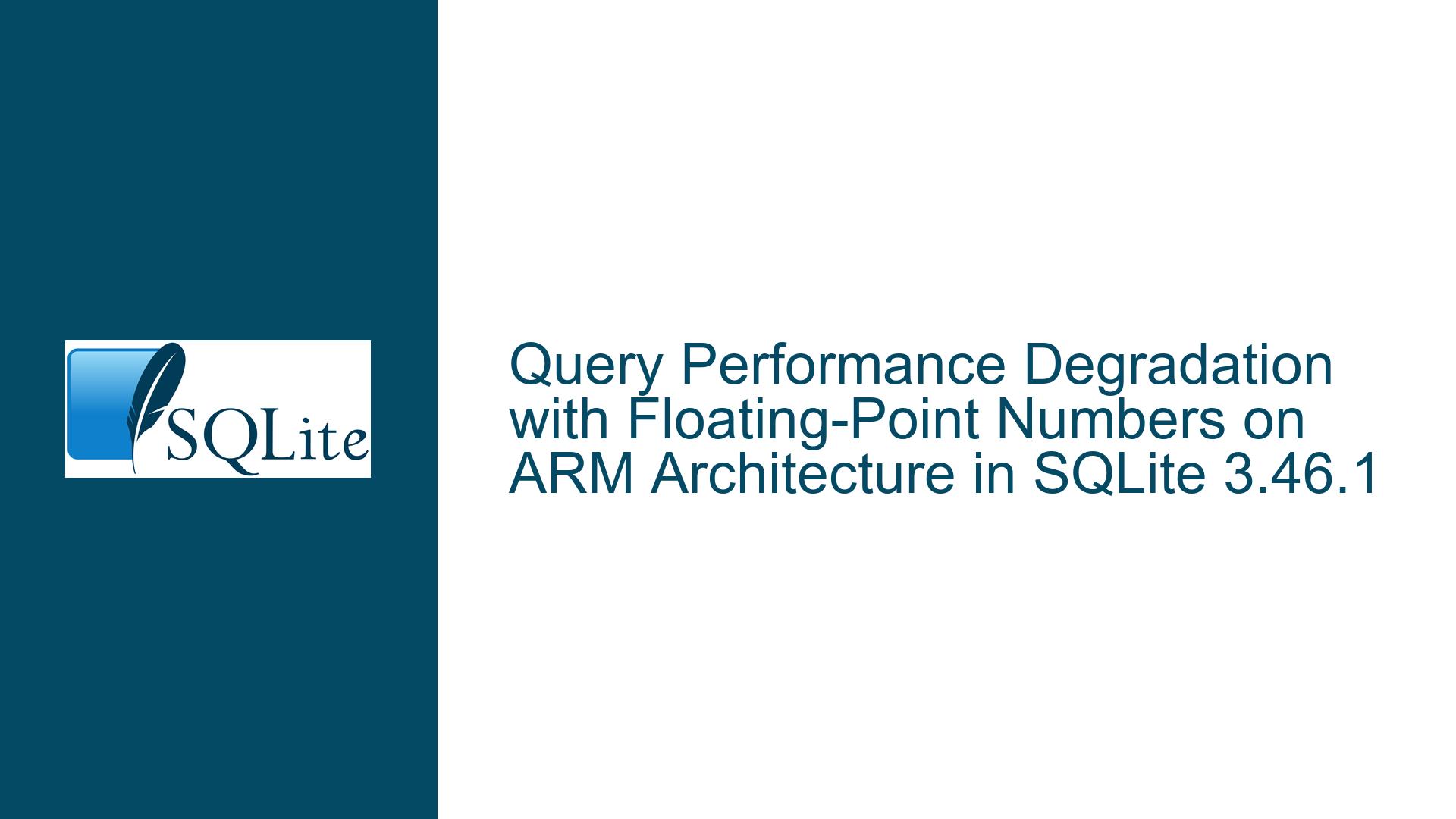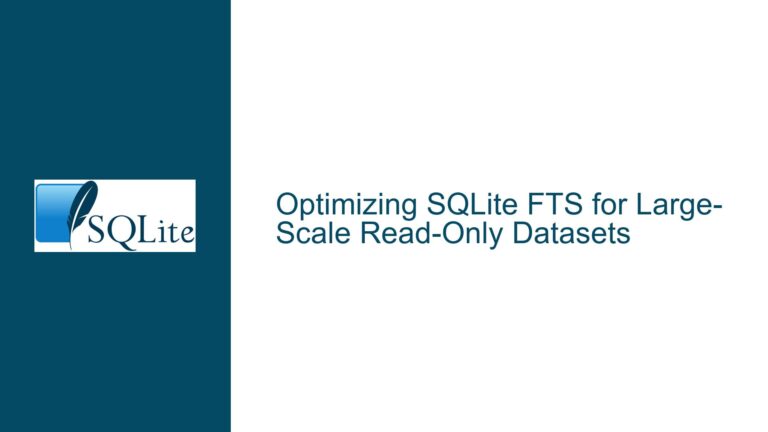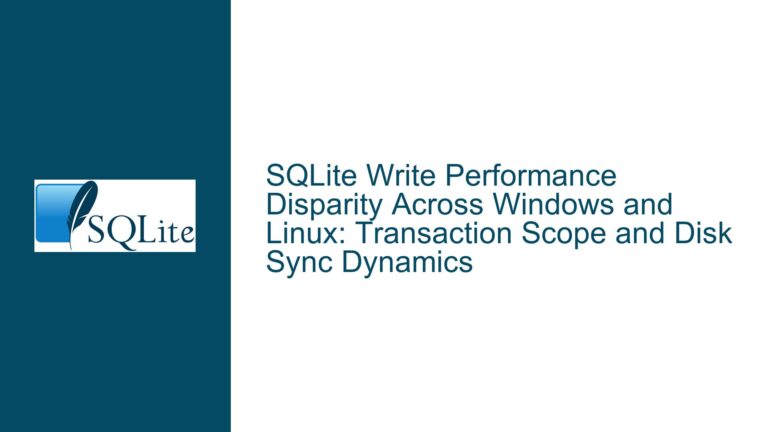Query Performance Degradation with Floating-Point Numbers on ARM Architecture in SQLite 3.46.1
Performance Degradation of Floating-Point Queries on ARM Architecture
The core issue revolves around a significant performance degradation observed when executing queries involving floating-point numbers on ARM architecture after upgrading SQLite from version 3.28 to 3.46.1. The problem manifests specifically in the sqlite3_str_vappendf function, which is responsible for formatting and appending strings, particularly when handling floating-point data types. This degradation is not observed on x86 architecture, where the performance between the two versions remains comparable or even improves in some cases. The discrepancy raises questions about the architectural differences between ARM and x86, particularly in how floating-point operations are handled, and whether the changes in SQLite’s implementation of sqlite3_str_vappendf are optimized for ARM’s floating-point capabilities.
The issue is further complicated by the fact that the ARM architecture in question is armv7l, which may or may not have dedicated floating-point hardware. The presence or absence of such hardware can significantly impact the performance of floating-point operations, as software-based floating-point emulation is inherently slower than hardware-accelerated computations. This architectural nuance is critical to understanding the root cause of the performance degradation and devising an effective solution.
Architectural Differences in Floating-Point Handling Between ARM and x86
The performance discrepancy between ARM and x86 architectures can be attributed to several factors, primarily related to how floating-point operations are implemented and optimized in each architecture. On x86, floating-point operations are typically hardware-accelerated, with dedicated floating-point units (FPUs) that handle these computations efficiently. This hardware support allows x86 processors to execute floating-point operations with minimal overhead, resulting in consistent performance across different versions of SQLite.
In contrast, ARM architectures, particularly older or embedded variants like armv7l, may lack dedicated floating-point hardware. In such cases, floating-point operations are emulated in software, which introduces significant computational overhead. The sqlite3_str_vappendf function, which formats floating-point numbers into strings, relies heavily on these operations. The changes introduced in SQLite versions 3.42 to 3.43 aimed to improve the precision of floating-point handling, but these changes may have inadvertently increased the computational load on architectures without hardware floating-point support.
Another factor to consider is the compiler used for building SQLite on the ARM architecture. The arm-linux-gnueabi-gcc compiler may not be optimizing the floating-point operations as effectively as the compilers used for x86. Compiler optimizations play a crucial role in the performance of floating-point operations, and any inefficiencies in the generated machine code can exacerbate the performance degradation.
Diagnosing and Resolving Floating-Point Performance Issues on ARM
To address the performance degradation, a systematic approach is required to diagnose the root cause and implement appropriate fixes. The first step is to verify whether the ARM CPU in question has hardware floating-point support. This can be done by examining the processor’s specifications or using diagnostic tools to check for the presence of an FPU. If hardware floating-point support is absent, the performance degradation is likely due to the increased computational overhead of software-based floating-point emulation.
If hardware floating-point support is confirmed, the next step is to ensure that the SQLite library is built with the appropriate compiler flags to leverage this hardware. The arm-linux-gnueabi-gcc compiler supports various flags for optimizing floating-point operations, such as -mfpu and -mfloat-abi. These flags should be configured to match the capabilities of the target ARM architecture. For example, using -mfpu=vfpv3 and -mfloat-abi=hard can enable hardware-accelerated floating-point operations, potentially mitigating the performance degradation.
Another approach is to analyze the specific changes made to the sqlite3_str_vappendf function in SQLite versions 3.42 to 3.43. These changes aimed to improve floating-point precision but may have introduced inefficiencies on architectures without hardware floating-point support. If this is the case, it may be necessary to modify the function to include architecture-specific optimizations. For example, conditional compilation directives could be used to enable different implementations of sqlite3_str_vappendf for ARM and x86 architectures, ensuring that each architecture uses the most efficient implementation.
In addition to these technical solutions, it is also worth considering the broader context of the application. If floating-point operations are a critical part of the workload, it may be beneficial to explore alternative data types or representations that are more efficient on ARM architectures. For example, using fixed-point arithmetic or integer-based representations for numerical data can reduce the reliance on floating-point operations and improve overall performance.
Finally, it is essential to conduct thorough performance testing after implementing any changes to verify their effectiveness. This testing should include both micro-benchmarks, such as the 1000-query test mentioned in the original discussion, and real-world workloads to ensure that the changes have a positive impact on overall application performance. By following these steps, it is possible to diagnose and resolve the floating-point performance issues on ARM architecture, ensuring that SQLite delivers optimal performance across all supported platforms.






